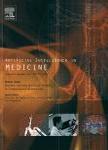版权所有:内蒙古大学图书馆 技术提供:维普资讯• 智图
内蒙古自治区呼和浩特市赛罕区大学西街235号 邮编: 010021

作者机构:Univ Queensland Dept Math Brisbane Qld 4072 Australia Univ Queensland Inst Mol Biosci Brisbane Qld 4072 Australia Curtin Univ Technol Sch Publ Hlth Perth WA 6845 Australia
出 版 物:《ARTIFICIAL INTELLIGENCE IN MEDICINE》 (人工智能在医学领域的应用)
年 卷 期:2006年第36卷第3期
页 面:257-267页
核心收录:
学科分类:0831[工学-生物医学工程(可授工学、理学、医学学位)] 1001[医学-基础医学(可授医学、理学学位)] 0812[工学-计算机科学与技术(可授工学、理学学位)] 10[医学]
基 金:National Health and Medical Research Council of Australia Australian Research Council, ARC
主 题:EM algorithm mixture of experts incremental update length of stay machine learning algorithm on-line prediction
摘 要:Objective: Inpatient length of stay (LOS) is an important measure of hospital activity, health care resource consumption, and patient acuity. This research work aims at developing an incremental expectation maximization (EM) based learning approach on mixture of experts (ME) system for on-line prediction of LOS. The use of a batchmode learning process in most existing artificial neural networks to predict LOS is unrealistic, as the data become available over time and their pattern change dynamically. In contrast, an on-line process is capable of providing an output whenever a new datum becomes available. This on-the-spot information is therefore more useful and practical for making decisions, especially when one deals with a tremendous amount of data. Methods and material: The proposed approach is illustrated using a real example of gastroenteritis LOS data. The data set was extracted from a retrospective cohort study on all infants born in 1995-1997 and their subsequent admissions for gastroenteritis. The total number of admissions in this data set was n = 692. Linked hospitalization records of the cohort were retrieved retrospectively to derive the outcome measure, patient demographics, and associated co-morbidities information. A comparative study of the incremental learning and the batch-mode learning algorithms is considered. The performances of the learning algorithms are compared based on the mean absolute difference (MAD) between the predictions and the actual LOS, and the proportion of predictions with MAD 1 day (Prop(MAD 1)). The significance of the comparison is assessed through a regression analysis. Results: The incremental learning algorithm provides better on-line prediction of LOS when the system has gained sufficient training from more examples (MAD = 1.77 days and Prop(MAD 1) = 54.3%), compared to that using the batch-mode learning. The regression analysis indicates a significant decrease of MAD (p-value = 0.063) and a significant (p-value =